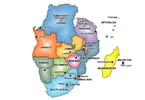(Questions for Skal International’s current president, Hulya Aslantas. She tackles issues ranging from the economy to current social issues involving tourism. She is also promoting Skal International’s meeting in Paris to commemorate the 75th anniversary of structured tourism.)
eTN: In your speech yesterday you talked about ambassadors of peace. Can you elaborate more on that, as far as Skal’s perception – what that is?
Hulya: Because Skal members are in 90 countries, 500 locations, some 20,000 members, they are leaders of the travel industry in their respective groups, and they have the experience, they have the knowledge, and at a certain executive level, they become Skal members. And as such, Skal represents all the industry as you know. We have members from hotels, travel agents, transportation companies, travel media, schools – everything connected with tourism, we have their high executive officers [who] are Skal members. In addition to networking and doing business and growing our friendship together, I believe that Skal and all the Skal members have a duty also to ensure the sustainability of tourism, of our profession, because local governments, private companies, they might have different motives, but we are an NGO so we can be a pressure group to tell and to direct the tourism in the right direction, because we are the ones to worry about the healthy growth of tourism. It’s not always money, it’s not always pure nature, but we have to find the right balance in the different aspects of tourism. In that respect, the leaders in tourism, we have to take care of the quality. We should never let quality down. Price should not always be the issue, but someone has to remind us. So I’m saying that all Skal members have the duty of first creating the awareness and then being after those values. And in all this, there’s the element of culture, which I also mentioned yesterday – that I would like to use this as my theme of the year. I’m saying that Skal members can help to bridge the cultures, because we are in so many different cultures, in more than 90 countries, and the number of countries is growing every day. Being from so many different companies, yet we speak the same language of tourism, and we are very closely united. So, all together, if we can create this cultural exchange between all these different people, different parts of the world, then people will then start knowing each other better, which will kill the prejudices, which will kill the pre-conceived ideas, and this way people will get closer; therefore, I’m saying every Skalleague is an ambassador of peace to make this happen.
eTN: Kill perception is a strong phrase. Be more specific in what you mean by that.
Hulya: Unfortunately, in today’s “fast food” industry, people do not have too much time to go in to depth of every new idea or every new thing they hear, but there are some stereotype images; they like take it from the shelf – whatever they hear, they believe. No one has the time to go deep down to really understand what it is. So a lot of people, especially the media, is sometimes giving one impression, and people take that impression. And people, if they fight and if there are wars, I think it’s because of misconceptions. The more people and nations are closer and the more they know each other’s customs, they know each other’s culture, then they start finding out that there are, in fact, more similarities than differences. And the minute this interaction is well established, there is no way of fighting, but on the contrary, they will be together and they will cooperate. Look at Europe, look at our recent history. There has been the hundred year wars in all Europe – Britain was fighting with France, France was fighting with Germany, because even in those days they did not know each other. So everyone had his own culture. And today, can you imagine a war between those European nations? It’s simply because they did not know each other very well, but there are now some root corners of the world, and they don’t know each other, so we just need to bring them closer.
eTN: You also made a point about government being now weaker and then the private organizations are now stronger – that is a very bold statement to make, especially in these times.
Hulya: I’m not saying they’re weaker. I’m saying that the futurist people, are saying that the 21st century, the governments will get weaker and smaller. When I’m saying weaker, it will get smaller – maybe I did not use the right word – they will get smaller, but the civil initiative will become; that means the people thinking – their ideas and their pressure groups will weigh more. This is really what I meant, and the people, themselves, they will decide, and they will want…their pressure… the governments will be obliged to do… and they will not dictate, but the pressure will come from bottom up, not from up down. This is not me saying, but really this is people saying the 21st century will be like this.
eTN: Skal is an international organization. What is your take on what’s going on in Zimbabwe where the tourism infrastructure is the envy of a lot African destinations because it’s there – hotels are there, airports are there. As president of Skal, how would you approach promoting or even not promoting tourism to Zimbabwe in the current political climate?
Hulya: But I think even in places where there might be problems, local problems, whatever, still tourism should continue, because again, if tourism continues, people will go and will seek themselves. And not only they will seek themselves, but also local people talking to the foreign visitors, they will learn from each other. Again, no one should stop going to any country, because of any prejudice or saying that I’m not going there because I don’t like that country or the way they are governed. On the contrary – they should go and they have to try to see, because every country has its own history, has its own reality, nothing is of the same shape, although from a distance, we try, we tend, in spite of today’s technologies, we tend to take some stereotype A, B, C. It’s not that simple really.
eTN: No, it’s a lot more complex than that. You talked about duty of pressure groups. What policies are you talking about when you say that and how do you implement that?
Hulya: I think pressure group in every sector, you can make your own pressure group – in the medical sector, in the mining sector, industry, tourism, in everything. But again, it is from bottom up. It is the overall acceptance and willingness of the people who are in that very specific industry – they should decide what they want more than they should be told what they should want.
eTN: Excellent; that’s a great point of view. Tourism through peace and friendship – you mentioned that yesterday. Can you elaborate more on that?
Hulya: This is a presidential theme that our first lady president Mary Bennett, had put in place, and this is a presidential team that is coming out of today from year 2002 or 3 even. Because how can you have tourism if there is no peace? In a place where there is war going on, obviously, there can’t be tourism. But it’s also vice versa sometimes. You need tourism to also kill wars, so it’s the tourism through peace, peace through tourism; they really go hand in hand together. So to that element, in fact, I am adding now as my presidential team, bridging the cultures, because with bridging the cultures now, I am saying that tourism, if it is done without culture, it doesn’t always help for the peace. Because there are some kinds of tourism, as we know, which is developing very fast – mass tourism – going with charters, to resorts, without really interacting with the local people; then, this type of tourism alone will not help this cultural interaction. Therefore, the cultural dimension of tourism should be there. And I’m saying that, only if people interact where they are, they try to learn the locals, and the locals try to learn from the foreigners, without having walls in between the resorts and the local people, then this kind of tourism, where the cultures are bridged, this will serve the world peace.
eTN: I think that is an excellent idea, however, here’s what I want to tell you. Based on the Maldives alone, they have a new administration now, but before that, the government itself limited the interaction of the locals.
Hulya: You see, this is wrong; this is wrong.
eTN: So Skal International, as an organization, how do you plan to…
Hulya: That’s what I’m saying. If we believe, and we focus on these… the management, the executive body, the president, has a duty to make some strategies. And if I’m saying that this what I mean by bridging the cultures, then we make our members ambassadors to carry this message down to their communities. So wherever we have Skal clubs in all these communities, their duty will be to preach this, will be to educate their responsibles in their respective areas. For example, our members, and again, the pressure groups, they not only educate their members, but they have to create the awareness, and they are the ones who should educate the government. Because some governments in some remote places, they might think that for the welfare of the tourism, they should really protect the tourists and not let the locals interfere. They think they are doing something good. So our members have to tell them that this is wrong, and, in fact, this is a major element of sustainable development – it’s interaction with the cultural and the social media where they are.
eTN: You said you should make sure that tourism is moving in the right direction. Can you elaborate more on this?
Hulya: Yes, tourism moving in the right direction, meaning we don’t forget it, for example, forgetting the component of quality, certain standards, ethics, protection of children. Because tourism is a broad industry, and it has many elements, and if we let it grow without too much control, it may get out of control.
eTN: And there are issues there right now.
Hulya: There are issues; there are issues, so there are certain issues which should be very well elaborated and sometimes controlled and directed. So for example, with this mass tourism – I’m really scared of mass tourism sometimes. It’s too much. It’s losing the individuality, it doesn’t really see the destination as it is. And when the price is the only issue, then unfortunately, quality is going down, but we cannot let quality go down. Therefore, like in Turkey, we have introduced the Skal Quality Awards, which we called Skal Quality, Skalite, we called it, and this is the eleventh year already that Skalite Awards has become the only awards scheme in travel and tourism, and we are awarding only persons and companies who are working for the quality in tourism. We are not awarding the biggest or the one who brought the maximum number of tourists or the one who brought the maximum number for an exchange. We are only awarding those companies in tourism who have added to the quality of the product, which is, I think, a very important aspect that needs to be reminded. So we Skal members, we are there to highlight such best practices and to tell to the people this is now what is to awarded without bringing so many numbers.
eTN: I personally think that’s a great idea. Now that you’re the president of Skal International, are you going to come up with a version of this in the international level?
Hulya: In fact, we already have it. I had wrote this already when I was a counselor in Skal International, so we already have the Skal Quality Awards as a product of Skal International, except the name, because there was some misunderstanding with the name, but we have the program called Skal Quality Awards, which is an official document of Skal International, but, of course, we would like to push it more during my presidency.
eTN: When does this normally happen?
Hulya: In Turkey, it happens every year around October, November.
eTN: For those who are not familiar with Skal, can you describe the organization?
Hulya: Oh, yes. Skal is a fantastic organization, and I’m saying it’s the best kept secret for awhile, because we have many, many unique features. And as in every sector, everyone has a competitor, but Skal does not have a competitor, and will never have a competitor, because we have such unique features, that it’s impossible to equal that. What are they? First of all, Skal International was established as an association in 1934 even before tourism was recognized as a separate industry, major industry. It was a first grouping of the travel and tourism professionals, and for many years, it remained the unique club of the travel professionals. We are, therefore, 75 years old. Next year we are celebrating our 75th anniversary. In that respect, we are unique, and no one can equal that anymore; you cannot go back in history. We are probably the largest tourism association in 90 countries, 500 locations, over 20,000 actual members. And we are the best structured. In 500 locations, we have this incredible organization established through our statutes, bylaws, very, I must say…
eTN: Transparency.
Hulya: Transparent, but also very strict rules. So the whole thing is in place; if it operates everywhere the same, is very well controlled, etc., so the structure is very nice. And also, the other uniqueness, is that, among all this, all the members are to present different segments of the tourism industry. It is not just about getting here together or it’s not just the travel agents, but we are all the segments of the travel and tourism industry – the old executives in the travel and tourism industry get together under Skal. And this is what makes us the biggest and the only NGO in tourism, because when we are together, we represent the whole tourism; it’s not just one part of the tourism, but the whole sector is represented. Therefore, we should aim, and our ambition should be, to be a pressure group for the embettering standards of the tourism – of our local tourism and the world tourism because all our members are, we represent, all together, all the branches of the industry. So in that sense, Skal is really unique and a fantastic organization.
eTN: That makes perfect sense, and it is a laudable organization. Now, what does your job as president entail?
Hulya: So really my job is to preach to the world all about Skal and not only to the world, but also to our members, because I am always saying that if you are born into a very rich family, you don’t know what is being poor or what is being hungry. Because Skal members are born into this very rich organization who has all these unique features, and I’m afraid over the years, we tend to take it for granted. Now, my duty is to preach to all our members about our, not only about our unique features, but with those unique features, we have the responsibility towards world tourism. So we should all assume, all these things that I’ve been telling you, some responsibilities, because we are the pioneers, we are the leaders in our respective areas, so we have the duty to carry on the messages of sustainability, of ethics, of this bridge in cultures, and of being the ambassadors of peace. So this is over and above our profession, we have the duty for our profession, to work for our profession.
eTN: I just came from a conference that dealt with ethical practices in tourism, and one of the big subjects was nonprofit organizations making profits by membership fees and/or holding summits. What is your position on that?
Hulya: That’s not the case with Skal; that’s all I can say to start with, but if an organization can make some money and use that money for a certain cause, why not? But people, because these are voluntary groupings and voluntary associations, people will join and will stay there as long as they see a benefit in it. So no one is forcing them, really. But I don’t see, at least Skal is not doing anything like that, and I wish we were doing more money.
eTN: As long as there is transparency.
Hulya: And moreover, you know, we, of course, we all are, we have our organization in a country where we are audited and every records are there and our budget and everything is very clear, very transparent. But if any money is there, since we are a nonprofit organization, that money is to be spent again for the welfare of our members or of the community, so, any extra money has a place to go, for sure.
eTN: Excellent; that’s good. Where does Skal stand in the global economic crisis?
Hulya: Well, we are living with it, because all our members, after all, they have some parts, some way connected with some company who is actually doing the business, and we all are going through this very interesting era. But I think tourism, as we always say, tourism is a very sensitive industry, yes, but tourism has lived in the past few years so many different problems, that I think we have also developed our own, how do you call it…
eTN: Resistance?
Hulya: Resistance, and we know how to protect ourselves, because tourism is an industry today that no one can stop. We thought this kind of a disease or that kind of a terrorism or this kind of an unrest, was stopping tourism – no, this was only for a short while. But I think from today, from now, tourism is something like eating, drinking, sleeping. Tourism will never stop; tourism can only grow, and it will have its own sort of precautions and maybe changing of the rules, but tourism will always grow. And I don’t believe that the current crisis that everybody is talking about, I think it’s more psychological than it is, and I think we will overcome. I think our members are strong enough; this industry is very strong to overcome. Maybe there will be some shift in the industry, maybe there will be some, maybe some meetings will decrease, but overall, I don’t see any major setback in the tourism figures.
eTN: Climate change – what is Skal’s position on this issue?
Hulya: Oh, we are very sensitive in that. As you may remember, year 2002 was the year of ecotourism in (mountains?), as declared by United Nations. In that very year, Skal has decided to launch the eco-tourism awards. So this was the year we started the eco-tourism awards and really our aim there is, again, to show the best practices in that respect and to show to the world, to create the awareness, to create the sensitivity that we all have to be very careful. Again, talking about sustainability – what we are doing? We have some programs. For example, Skal last year has gathered ideas from all its members, and we have printed a booklet, the booklet called “101 Tips for Sustainable Tourism,” because everybody is talking about it, but what about it practically; what do I do tonight; what do I do in my office? So, theory put into practice. So this is, for example, a very nice booklet, which is available on our website. So we are asking all our members and the local chapters, local clubs to download this document and to print and make seminars, again, in their respective areas, to educate the people, the people who are working for tourism, again, the local governments – even the governments, they need a lot of education. Not knowing is not a shame; not learning is a shame, and we have the duty, again, I am coming to our responsibility, we have the duty which we are asking to our members on behalf of Skal, on behalf of the leaders of the tourism movement, to go and educate their respective societies, to tell them what they need to do to protect our world. Right now we are in the process of, we have finished the first draft; we are signing an agreement with the United Nations Environmental Program. It is a memorandum of understanding. We have done the first draft, and it is to be signed anytime, which I will let you know when we are doing the signing…
eTN: Under the UNWTO umbrella or…
Hulya: United Nations; it’s under UN – UNEP – United Nations Environmental Program. And the memorandum of understanding is ready to be signed in which there are some policies they are developing. So we will take those policies, give it to our members, we will take it for implementation, so we will use Skal membership for a real cause.
eTN: And the booklet that you were talking about – is that for public domain?
Hulya: It is in our public domain.
eTN: So it’s not a log in…
Hulya: No, no; it’s not, because we want this kind of information to be available to everyone, and also, last year, we have developed a separate page on our website, which in time most likely will turn into a blog, but at the moment, when you come to our website, www.skal.org, if you click on sustainable development logo, it takes you to a separate website where we have gathered all sorts of information about sustainable development, about eco-tourism awards – the present winners, the future entry rules. We have all the list of all the winners so far with their web addresses. We have all the announcements. So this is a page on which you find all sorts of practical information, postings, latest announcements and this “101 Tips” book is there when you click, you can read it through.
eTN: That’s excellent. I’m glad to hear that is available for anyone to download.
Hulya: Not for download, but, no, I’m sure they can download as well. The clubs can download it, but they can take a look at it.
eTN: Food crisis – where does Skal stand on the issue?
Hulya: See again, if the world tourism is improving in the right direction, it means it is creating jobs, it means it is helping to eliminate poverty, it means… But when you ask [about] the food crisis, you mean the agricultural…
eTN: Well, there is a food shortage problem that actually caused riots in some parts of the world.
Hulya: Well, of course, with the growing of our nation, when I was at high school, the world population was 2.5 billion… today we are getting 6.5, 7 – it’s really getting… it’s really getting a very, very crowded world. So, yes, our resources are getting scarce, and there must be… but there’s also a lot of food which is wasted, unfortunately. I mean, we are seeing it. A lot of food, a lot of… some of the resources… some parts of the world are just too rich and some resources are not properly used, and some others is very scarce, so a better balance is needed in between those lucky and less-lucky places. It’s a big project, of course.
eTN: Let’s talk about Turkey – what’s going on in tourism these days?
Hulya: Turkey’s tourism, I think, is another great, best practice to be looked at. When I started tourism in the 1970s, Turkey had only 50,000 beds, and today we are like close to a million beds. We were less than a million visitors come into Turkey; some couple of hundred thousand persons were coming to Turkey. Today, we are about 25 million tourists. Again, I don’t want to boost too much the numbers, but we have built a lot the coast; the Antalya coast, on the Mediterranean has incredible resorts. We have beautiful hotels, and the tourism industry is very dynamic. We are only growing, because, you know, we are really blessed. We are probably the most rich country in the world for tourism. I mean, we call ourselves an open-air museum. Everywhere you dig, because it is such a nice location, that all the past civilizations have come and lived in Turkey; in Anatolia, in the center, in Asia minor, what you call. This area has been more than 18, 20 civilizations pass by over… the history goes back to 10,000 years; even the first settlements were in Antalya. So we are very rich as far as historical remains are concerned. We are very rich with the beauty of the nature. We are surrounded by… three parts are surrounded by the sea. The climate is excellent, the food is excellent, the kitchen is excellent. So you have every component you need, again, more than you need to make it a wonderful tourism country. And I’m not saying that we are exploiting all of it yet. There is still much to be done; there are still many more products to be given up, but we are on the right way. Because we have the cultural tourism, we have the mass tourism, but we have a lot of alternative tourism. Turkey is also a place where we have a lot endemic plants; many unique things. Still, there are many more products that we need to develop, but it’s a great touristic country.
eTN: Does it really mean anything for Turkey to become part of the European Union from a tourism perspective?
Hulya: Well, not really, not really. That’s really a political thing which is on its way. It’s a networking, let’s call it – it’s a networking – unfortunately, whether you are there or there, it doesn’t really matter. The country is there, and it’s the most-friendly people, most welcoming people, and as my profession, I’ve always been a receptive agent in Turkey. Over 30 years, I am doing the same thing, and everyone from those days to today says the same thing as if, you know, they were taught, you know, when you go to Turkey say this. Everyone says the same sentence – Oh my God, we did not know Turkey was so nice, we did not know Turkey was so rich, we did not know people were so friendly. But, I mean, everyone says the same thing, and, of course, this is the biggest motivation we can have. After you hear those words, obviously, you would like to do better and better. But I think Turkey is a very good value for the money spent. We have very reasonable rates, but wonderful product; very nice hotels. The people working in tourism are very well. We have a lot of tourism schools; the education level also is very good, so it’s a fantastic country.
eTN: I think, actually, as a matter of fact, Turkish Airlines is one of the more profitable airlines these days.
Hulya: They are growing. When aviation is facing problems, Turkish Airlines is growing; it’s really growing.
eTN: How do you explain that phenomenon?
Hulya: I think it’s just the dynamism of our country. For example, you know, just to give you a very simple example, which even struck me. When these days the airlines are really in trouble and they are cutting even on the tea, coffee they are serving, on everything. And I was impressed myself, because I haven’t seen that before. On the flight from Istanbul to London, which was a morning flight, they serve breakfast, that’s fine. But before the breakfast, on the economy, they have even given [a] menu on economy class, regular flight, London – Istanbul. It’s only a three-hour flight.
eTN: It’s not a long flight.
Hulya: It’s not a very long flight, no. But even a menu was distributed on economy class and very nicely written, with incredible, very tasty, lots of choices, and a nice forward – enjoy your breakfast; we hope you’ll enjoy what we are presenting – and this type of personalized type of a greeting message, which I thought was amazing, you know, when some other companies are even charging the extra, not even extra – hand luggage…
eTN: Pillow.
Hulya: Or pillow, or whatever…
eTN: I need to come to Turkey and investigate what’s going on.
Hulya: Please do. In difficult times, we all know from history and from our marketing books, that you don’t cut on budgets. Those who don’t cut, at the end of the day, they are the winners.
eTN: Turkey tourism really is thriving.
Hulya: Yes.
eTN: And that’s an amazing thing to see.
Hulya: I think we are very, very dynamic, and as I said, Turkey has had its ups and downs, so we really don’t take this crisis too seriously.
eTN: Do you have anything else to add Hulya? It’s been wonderful.
Hulya: Absolutely. Well, one more thing, which is really exciting me as a president, is that during my term this year, I will have the honor of celebrating, we will have the honor of celebrating altogether with our members, our 75th anniversary next year. This is, I think, it will be a major milestone in the history of Skal, so I’m trying to make a very big event in Paris on the very day of 28th of April when…
eTN: You said Paris?
Hulya: Because it was established in Paris. And if you go to Paris to [the] Hotel Scribe, you will see a sign on the wall, which says, Skal International was established here in Hotel Scribe on 28th April 1934. So on the very same day – it’s a Tuesday – I’m planning, still there are many pending elements, but at least in my mind, I know what I want to do. I know I would like to make a very big celebration; a very big gala dinner trying to bring all of the stakeholders of the world tourism together to celebrate our 75th anniversary of structured tourism, if you will, because for me, this is really the starting of tourism with a structure. And, of course, I will let you know, and you will be already invited to this fantastic event, but I need to work at it all to get all the components.
WHAT TO TAKE AWAY FROM THIS ARTICLE:
- In addition to networking and doing business and growing our friendship together, I believe that Skal and all the Skal members have a duty also to ensure the sustainability of tourism, of our profession, because local governments, private companies, they might have different motives, but we are an NGO so we can be a pressure group to tell and to direct the tourism in the right direction, because we are the ones to worry about the healthy growth of tourism.
- Because Skal members are in 90 countries, 500 locations, some 20,000 members, they are leaders of the travel industry in their respective groups, and they have the experience, they have the knowledge, and at a certain executive level, they become Skal members.
- I'm saying that Skal members can help to bridge the cultures, because we are in so many different cultures, in more than 90 countries, and the number of countries is growing every day.






















